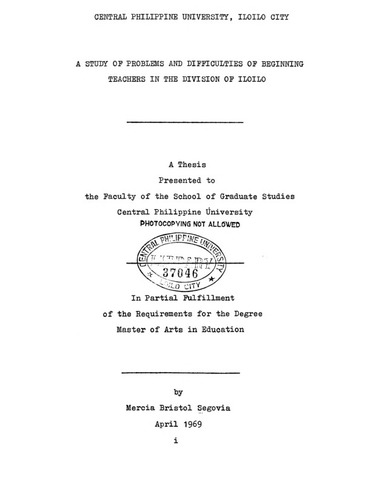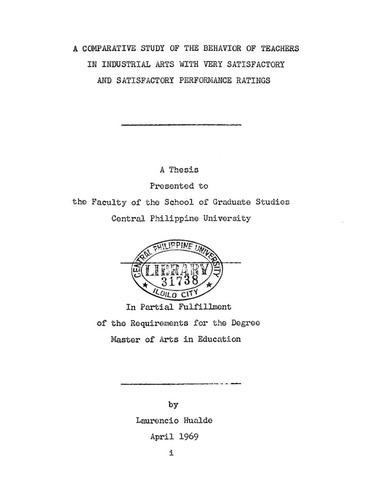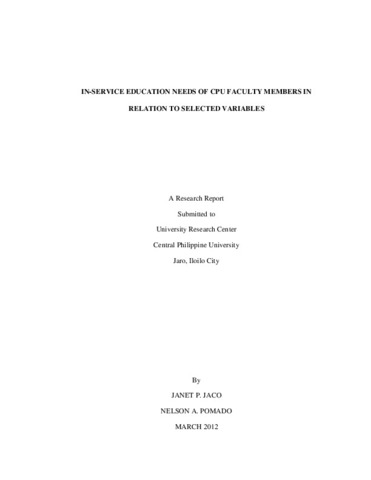A study of problems and difficulties of beginning teachers in the Division of Iloilo
| dc.contributor.adviser | Herradura, Elma S. | |
| dc.contributor.author | Segovia, Mercia Bristol | |
| dc.coverage.spatial | Iloilo | en |
| dc.date.accessioned | 2021-12-06T02:55:47Z | |
| dc.date.available | 2021-12-06T02:55:47Z | |
| dc.date.issued | 1969 | |
| dc.identifier.citation | Segovia, M. B. (1969). A study of problems and difficulties of beginning teachers in the Division of Iloilo (Unpublished Master’s thesis). Central Philippine University, Jaro, Iloilo City. | en_US |
| dc.identifier.uri | https://hdl.handle.net/20.500.12852/1761 | |
| dc.description | Abstract only | en_US |
| dc.description.abstract | This study was undertaken to survey the opinions of the Beginning teachers on how adequately prepared they were for the job and of what value the professional courses were to their job as full-fledged teachers. It also sought to find out how they obtained their first teaching position in the public elementary school. It also sought to identify the problems and difficulties of beginning teachers in order to propose measures for the improvement of the pre-service and in-service training of teachers. A preliminary survey of problems was made by means of observations, interviews, correspondence, and conversations with beginning teachers. The data collected were classified and formulated into a questionnaire. This asked for one or more paragraph-description of critical experiences met during the initial year of teaching. The paragraph responses were supplemented with readings from the Service Manual, Bureau of Public School publications, books, and periodicals relevant to the beginning teacher and were made the bases for the construction of a check list. This check list was tried out among a small group. Copies of this check list were distributed to the 290 beginning teachers in the Division of Iloilo. From the data, it was found that many of the problems and difficulties of beginning teachers were the results of the negligence of some people directly or indirectly responsible for the beginners’ successful initiation to the profession. One thing badly needed is an orientation program in the public elementary schools which may induct the beginner to his job and make him fully aware of factors necessary for easy and effective adaptation to his new school environment. Some other findings are: 1. Teacher-training institutions do not give beginning teachers job placement services. The graduate had to seek his own teaching job; others had to rely on the help of friends, relatives, and some school personnel. In many cases, any teaching assignment was accepted regardless of the applicant’s suitability for it. 2. Of the 290 beginning teachers, less than 25 per cent felt inadequately prepared for the teaching job. The reasons for feeling this inadequacy were attributed to factors which are as follows: (a) heavy study load; (b) insufficient time for study because of participation in several co-curricular activities; (c) many responsibilities to cope with; (d) insufficient time for practice teaching; (e) lack of interest in the college courses; (f) failure of instructors to teach what was badly needed in the field; and (g) exclusion in the teacher-training curriculum of courses which were needed in the teaching profession. 3. Two courses found out useful to professional teaching were Principles and Methods of Teaching and Student Teaching. Fundamental and Adult Education and Library Science were the least valuable of all the professional courses. 4. Beginning teachers felt the need for college training in the organization, management, and advisorship of co-curricular activities to be able to cope with these responsibilities in the field. Training was found necessary in conducting purok, zone organization and Parent Teacher Association (P.T.A.) meetings; preparing declaimers, singers, folk dancers, and athletes; directing pageants and plays; Girl Scouting and Boy Scouting. 5. The problems of beginning teachers included those of a personal nature, those arising from poor administration, those arising from supervisors’ neglect, and those involving social relationships with school personnel, parents, pupils, and the community. This investigation has established the necessity of: (1) setting up a teacher placement office in every teacher training institution; (2) providing adequate and functional counseling services in every teachers college; (3) enriching or revising descriptive content of course syllabi in the four-year elementary teacher education curriculum to include the organization, management, and advisorship of co-curricular activities; (4) planning and implementing an orientation or induction program for beginning teachers in every school division; and (5) providing a follow-up program of graduates by the teacher-training institutions. Recommendations for further research. The study suggests five other researches that may be profitable; namely, (1) a research study should be undertaken to determine the factors affecting fitness for teaching of prospective teachers; (2) a study concentrated on the professional problems of the beginning teachers would bring to light more facts needed in helping new teachers; (3) a study should be made of the supervisory and administrative services provided for new teachers; (4) an orientation program for beginning teachers should be planned. While this program is implemented for a period of one to two years, an experimental study should be conducted to determine its effectiveness; and (5) teacher-training institutions should have a followup program for their graduates. The effectiveness of this program should be evaluated every four years or so. | en_US |
| dc.format.extent | 143 leaves | en_US |
| dc.language.iso | en | en_US |
| dc.subject.ddc | GSL Theses 378.242 Se37 | en_US |
| dc.subject.lcsh | Teachers | en_US |
| dc.subject.lcsh | Teachers--Training of | en_US |
| dc.subject.lcsh | Elementary school teachers | en_US |
| dc.subject.lcsh | Elementary school teachers--Training of | en_US |
| dc.subject.lcsh | Philippines. Department of Education. Schools Division of Iloilo | en_US |
| dc.subject.lcsh | Philippines--Iloilo | en |
| dc.title | A study of problems and difficulties of beginning teachers in the Division of Iloilo | en_US |
| dc.type | Thesis | en_US |
| dc.description.bibliographicalreferences | Includes bibliographical references | en_US |
| dc.contributor.chair | Herradura, Elma S. | |
| dc.contributor.committeemember | Chambers, Elizabeth | |
| dc.contributor.committeemember | Ganchorre, Ciriaco C. | |
| dc.contributor.committeemember | Ruiz, Macario B. | |
| dc.contributor.committeemember | Alba, Leda G. | |
| dc.contributor.committeemember | Griño, Eliza U. | |
| dc.contributor.department | School of Graduate Studies | en_US |
| dc.description.degree | Master of Arts in Education | en_US |
| local.relation.associatedcontent | https://repository.cpu.edu.ph/handle/20.500.12852/2306 Full paper published in Southeast Asia Journal | en |





